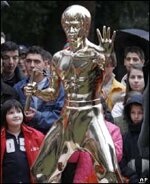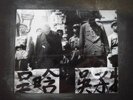From the Telegraph:
Hundreds of thousands of people living in towns and villages along the upper reaches of the Songhua river were allowed to continue using toxic water for more than a week, even though authorities knew that benzene levels were lethally high, Chinese officials have admitted.
Anger was growing in Jilin and Heilongjiang provinces as new details emerged of how officials lied to conceal the fact that a potentially deadly 50-mile long slick was slowly flowing through cities, towns and villages.
The sprawling city of Harbin remained the centre of containment efforts this weekend, with its water cut off for a fifth day.
But the authorities revealed that millions of people who live closer to the chemical plant where a huge blast occurred two weeks ago, releasing cancer-causing compounds, were kept in the dark for 10 days - despite the fact that some drew water regularly from the polluted river.
A water official in Jilin province said the decision not to reveal that in some places benzene levels were 108 times above the safety level was made because “we did not want to panic the public”.
AsiaPundit has been relatively quiet on the mess up north, aside from a few snarky comments on beer production.
No one else can really touch ESWN’s roundup of coverage of the Harbin water shutdown, which has been kept updated throughout the week (scroll down for recent entries). We can also thank ESWN for asking Beijing-based flack Imagethief how the authorities erred in dealing with the incident from a public-relations viewpoint.:
“The Chinese government’s response to the Harbin crisis has been a case study in bad PR management…”
That the Jilin chemical plant exploded and released tons of benzene was bad. It could have been incompetence or it could have been plain bad luck. But the actions of CNPC and the Jilin and Harbin governments after the disaster have tarred them with the stink of incompetence and untrustworthiness regardless of the reasons for the original disaster. They were caught in an enormous lie, and that makes everything else they have to say about the disaster untrustworthy. And people will remember.
Without having been in the boardroom, it is hard to say why the decision to cover up the disaster was made. It may be that Chinese doesn’t provide and incentive for openness about these sorts of things; this is an area where I don’t have enough information to make an informed judgment. Certainly neither the Chinese government nor Chinese business has a great reputation for transparency. The explosion would already be subjecting the plant to scrutiny for safety and operational standards. Perhaps a toxic release would have brought a different level of scrutiny, say from central government as opposed to malleable provincial authorities. And perhaps that level of scrutiny would have turned up some unpleasant truths surrounding CNPC, the plant and the Jilin government.
Government is a Brand, Whether You Like it or Not
Let’s think of the Chinese government as a brand. This is an oversimplification, but the comparison holds true in many ways. Like all brands, government, in this case Chinese Government (new and improved!), possesses or seeks certain attributes that it believes will help it in the execution of its business. Competence, compassion, pragmatism, security, and so on. For most governments, trust is an essential attribute. The job of governing is easier when people trust what the government tells them and trust that the government will provide essential services and intervene in times of stress or disaster.
To see how erosion of trust can affect a government badly, look at the current US administration, which has two trust serious issues right now. First, many people saw Katrina as a huge abrogation of trust, and it severely damaged government credibility at municipal, state and federal levels by undermining the compact that the government will help to mitigate severe crisis. Second, a majority of the US public now believes that it was misled about the reasons for launching the war in Iraq. That is eroding public support and making it much harder for the administration to prosecute its plans in Iraq.
With regards to China, the foreign knee-jerk reaction is to say, “The Chinese government is authoritarian! Why should they give a damn about trust?” But I would wager that most Chinese people trust their government on a fundamental level, or at least want to trust it, and that the Chinese central government places a fairly high priority on maintaining that trust. You can see aspects of this in many of the initiatives the CCP is prioritizing right now. Programs to control corruption and help the rural poor to climb out of miserable poverties are all part of building and maintaining trust. Even propaganda is designed to foster trust in the government. Power may flow from the barrel of a gun, but it is significantly easier to hold onto that power and exercise it effectively when people trust you. The Chinese government is executing several simultaneous, tricky balancing acts. I think they realize that their jobs will be much easier the more people trust them. Unfortunately, they seem unable to break their bad, Stalinist habits.
It’s not surprising that officials from Jilin and CNPC didn’t want to publicize the massive environmental damage caused to the water supplies of the Songhua River. Still, it’s beyond belief that they thought a a 50-mile long slick of benzene would go without notice.
Some reports are saying that the local authorities held back on announcing the full damage caused by the disaster because they were waiting for central government direction. If we assume this is the case, it still remains to be seen whether Beijing was actively trying to cover things up or if this was just a matter of bureaucratic incompetence.
I never expect to find out but, either way, AsiaPundit’s judgement is pretty damning, and so too is the judgement of residents of villages along the Songhua. From the NYT.:
Liu Shiying lifted the metal cover off the clay cistern in a corner of the bare kitchen and lowered a tin ladle into what remained of her water supply. Then she raised a scoop to her mouth.
“Do you think it smells?” she asked on Saturday, not taking a sip. “We’re still drinking this. It is our only choice.”
Ms. Liu lives in one of the dingy villages on the outskirts of Harbin, the provincial capital whose water supply had been shut off for four days to prevent contamination from a chemical spill that dumped a huge tide of pollution into the city’s main water source, the Songhua River. …
Ms. Liu said the local water had become cloudy in recent weeks and she could not tell whether it had changed, or become contaminated, as the pollution flowed by. On Friday, village officials finally turned off the faucets from the wells, but people continued drinking well water stored in pots and cisterns.
“No one was sending any water to us,” Ms. Tao said. “We watched on television all the city people getting water delivered to their doors. Who cares about us village people?”
Hu and Wen’s focus is said to be on rural areas and their development. AsiaPundit has generally given them the benefit of the doubt on this (actually, it’s less a matter of giving them the benefit of the doubt, and more about harboring doubts that they aren’t as market-oriented as some of the Shanghai clique, notably Zhu Rongji.) If pollution is as bad as some reports have said, if an upsurge in acute leukemia is imminent, then their pro-peasant message will be rather undermined.
That said, AsiaPundit will withhold any judgement of malice.
As a reporter by day, AP frequently struggles to get state-owned corporations to reveal things that would be considered good news. A couple of weeks back, China allowed its first inter-broker dealership. A press release was issued by the Chinese party, and AP’s agency didn’t receive one. Calls to the Chinese side were fruitless. They explained that no-one in the office was authorized to re-issue a press release that had been earlier issued, and refused to interrupt the person who was authorized to give the statement.
The assessment in this Stratfor report is closest to AP’s own thinking (via Secular-Right India):
It is clear once again that the Chinese government bureaucracy remains incapable of making rapid decisions for dealing with unexpected problems. This inability to decide what to do for more than 10 days created panic in Harbin and further undermined trust in the local and national governments and Communist Party. In 1989, it was indecisiveness that contributed to the violent end to student protests in Tiananmen Square. And indecisiveness led first to the delay and then to the draconian crackdown on the Falun Gong after its members gathered for a silent protest outside central government housing in 1999.
As the central government prepares to enact the latest five-year economic plan, it will undoubtedly face many new and frequently unexpected challenges. A concerted effort to shift the balance of wealth in the country, to urge (if not require) “sacrifice” from the already well-off to bring up the other 900 million rural Chinese will bring massive social changes and threaten the political and economic interests and power of many. But, as the Harbin case shows, China’s leadership, on the local and national levels, is still far from capable of making rapid decisions and acting quickly to pre-empt — or at least mitigate — problems as they arise, rather than simply trying to ignore them and make up for it later. Trouble is brewing just beneath the surface, and while a watched pot may not boil, ignoring a pressure cooker can be disastrous.
Other essential reading, a blog by a Jilin-born journalist covering the crisis there (h/t Other Lisa)
Technorati Tags: asia, censorship, china, corruption, east asia, northeast asia
 BELGRADE, Nov. 26 (Xinhuanet) — A bronze statue of martial arts legend Bruce Lee was unveiled in the ethnically divided city of Mostar in Bosnia-Herzegovina on Saturday, a day before a second statue of him is unveiled in Hong Kong to mark his 65th birthday.
BELGRADE, Nov. 26 (Xinhuanet) — A bronze statue of martial arts legend Bruce Lee was unveiled in the ethnically divided city of Mostar in Bosnia-Herzegovina on Saturday, a day before a second statue of him is unveiled in Hong Kong to mark his 65th birthday.



































